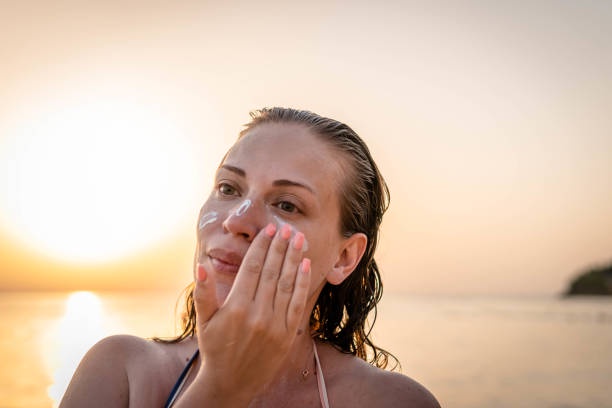When you’re out in the sun, UV rays can damage your skin and cause a sunburn. To protect your skin from these harmful rays, you should wear an effective sunscreen or sunblock cream every time you go outdoors. If you have sensitive or acne-prone skin, picking the right sunscreen may be a little less straightforward than it is for others.
That’s because some sunscreens may aggravate your sensitive skin or trigger breakouts. In this blog post, we will answer all your burning questions about the many types of sunblock creams on the market: What are they? How do they work? Which ones are best for your skin? And how to use them correctly every time?
What is a Sunblock Cream?
Sunblock creams are designed to protect your skin from the harmful UV rays of the sun. They are usually slathered on your skin as a paste. The protection comes from the active ingredient in the cream: titanium dioxide. It reflects the UV rays, which otherwise would damage your skin and cause sunburn.
The major difference between sunscreen and sunblock creams is that sunscreen contains chemicals that absorb the UV rays whereas sunblock creams have titanium dioxide that reflects the rays. Another difference between the two is that sunscreen is often applied to the skin as a liquid, while sunblock creams are applied as a paste.
Sunblock creams are a great choice for people with sensitive skin. They are also recommended for children, people with allergies, and those who want an extra layer of protection from the sun. Sunblock creams are perfect for times when you’re outdoors and it’s cloudy.
How Does Sunblock Cream Work?
When applied to the skin, sunblock creams use titanium dioxide to reflect the UV rays, protecting you from sunburn and sun damage. Ideally, you should apply the cream 15-20 minutes before going out in the sun, giving it enough time to be absorbed into the skin properly.
This will ensure that it offers full protection against the sun’s harmful rays. Sunscreen, on the other hand, is applied immediately before you head out in the sun. It contains chemicals that are designed to absorb the UV rays, breaking them down before they can be absorbed by your skin. While sunblock creams are a great choice for people with sensitive skin, it’s worth noting that sunscreen might be a better choice for you if you have acne-prone skin.
The Best SPF for Sensitive Skin: Finding the Right One for You
When searching for the best SPF for sensitive skin, you should look for the following features: It should have at least a 15 SPF rating. It should be oil-free. It should contain moisturizers that will help hydrate your skin It should have a lightweight formula, suitable for sensitive skin. When you have acne-prone skin, you should avoid sunscreens that are loaded with heavy, thick ingredients, as they will clog your pores and cause breakouts. Instead, opt for a sunscreen that contains lightweight ingredients, such as hydrating oils, minerals, and antioxidants.
Acne-friendly Sunscreen: Does It Exist?
As we’ve seen, sunscreens can be a suitable choice for sensitive skin, even for people with acne. So yes, there are acne-friendly sunscreens on the market. They are lightweight, and contain mineral-rich ingredients, like zinc oxide and titanium dioxide.
They also often include potent antioxidants and soothing plant extracts, which makes them perfect for acne-prone skin. There are many acne-friendly sunscreens on the market, from both drugstore and high-end brands. You can find them by looking for a sunscreen with the following characteristics: It should have a high SPF. If you have acne-prone skin, you should always choose a sunscreen with a high SPF and a lightweight formula.
Tips to Protect Sensitive Skin from The Sun
- Apply sunscreen or sunblock cream half an hour before going outdoors to allow it to be absorbed by your skin. Reapply every two hours, or immediately after swimming.
- Don’t rely on the weather to tell if you need sunscreen or sunblock cream. Clouds don’t block all UV rays, so it’s important to always apply sunscreen or sunblock cream when outdoors.
- Wear long-sleeved shirts and a wide-brimmed hat to protect your face, ears, and neck from the sun’s harmful rays.
- Avoid direct sunlight between the hours of 11 a.m. and 3 p.m., when the sun’s UV rays are at their strongest.
- Keep in mind that there are other factors besides UV rays that can damage your skin. Things like pollution and sand are bad for the skin too, so try to protect your skin from all of these factors.
Conclusion
Sunscreen is often associated with summer, but it’s important to apply it year-round. UV rays are present all year, even on cloudy days. If you have sensitive skin, you should always look for lightweight ingredients in a sunscreen or sunblock cream.
Mineral-rich ingredients, like zinc oxide and titanium dioxide, are good choices for sensitive skin, as they are non-comedogenic and non-irritating. While sunscreens are often chosen for their high SPF, remember that sunblock creams are also effective at protecting the skin from UV rays. So, don’t forget to apply sunscreen or sunblock cream next time you go outside!
References:
- The determination of antioxidants activity and sunblock Sterculia populifolia extract- based cream
http://pbr.mazums.ac.ir/article-1-192-en.html - Stability of Water-in-Oil Emulsion by Gelation;Application of Sun-Block Cream containing Titanium Dioxide( T i O 2 )
https://koreascience.kr/article/JAKO200023360473864.page


No comments yet